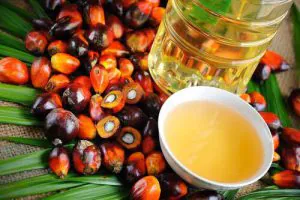Palm oil is big business for major palm oil producing countries. The global market value was recorded at USD 65.73 billion in 2015 and is expected to reach USD 92.84 billion with an anticipated CAGR of 7.2% by the end of 2021. So what makes palm oil so important? To begin with, it is a widely used and an extremely versatile raw material. Palm oil is not only intended for cooking, but is also found in 50% of all packaged foods as well soaps and cosmetic products, and is even being considered as a biofuel. With the market surging, 91��Ƭ�� has decided to do a breakdown of the top 5��palm oil producing countries in 2017.
See How 91��Ƭ�� Helps Palm Oil Buyers and Suppliers Connect
But I Heard Palm Oil Is Bad…
Palm oil may have its controversies but it still accounts for 35% of the global cooking oil market and offers a number of health and economic benefits. The use of palm oil is known to help increase energy levels, fight cancer, balance hormones and prevent cardiovascular issues, among other things. The downside to palm oil is the way it is cultivated. Deforestation is occurring in some of the richest rainforests, and local workers’ human rights are key areas of improvement.
The global��palm oil industry has the potential to make a positive impact on global economics, public health and preserving the environment. Palm oil is the most efficient of all the oil crops, and on average produces 10 tonnes of fruit per hectare, thus requiring 10x less land than the other three major oil crops: soy, rapeseed, and sunflower. This palm oil resource is cheap to produce and has the potential to help feed millions of people. Sustainable practices are being implemented by the top palm oil producing countries in the world to help make this a thriving industry without as many repercussions.
Top Five Palm Oil Producing Countries
91��Ƭ�� presents the list of the top five palm oil producing countries in order of production and then analyzes their market statistics and palm oil sustainability efforts.
Indonesia
Indonesia is the largest palm oil producing country in the world. It produces, on average, 36 million tonnes of palm oil per year and is expecting an additional 4 million hectares of palm oil plantation land by 2020. Land cleared for oil palm trees has tripled since the year 2000 resulting in a grand total of about 11.3 million hectares of land for palm oil plantations. Since the world depends on Indonesia for 62% of its palm oil supply, this commodity is the backbone of the Indonesian economy. Without the USD 14.4 billion from exports in 2016, the country would suffer greatly, which is why sustainable palm oil practices that are fair to workers and the environment must continue to be implemented.

In 2011 Indonesia created a mandatory Indonesian Sustainable Palm Oil (ISPO) certification program to cut back on environmental destruction and protect the lush, natural rainforests filling the country. Currently, 1.5 million hectares of land pass the sustainability standards and the government is still waiting for hundreds of palm oil companies to comply to the certification process. As of September 2017, Indonesia is seeking support for their ISPO standard from the United Nations Development Programme in order to ensure its success.
Must Read:��Top 10 Indonesian Palm Oil Companies
Malaysia
Malaysia comes in at a close second as a top palm oil producing country, contributing 19.5 million tonnes of palm oil in 2014, up 1.5% from 2013’s 19.2 million. Together, these two countries produce 85% of the global palm oil supply. Malaysia’s palm oil industry plays a large part in the stability of their economy, just like Indonesia, by accounting for 5-6% of their GDP (USD 16.1 billion in 2015). There are plans in place to reach a market value of USD 56.5 billion by 2020.
Currently, 4.49 million hectares of Malaysian land is used for oil palm cultivation, that produces 17.73 million tonnes of palm oil and 2.13 million tonnes of palm kernel oil. Malaysia is one the largest producers and exporters of palm oil in the world, accounting for 11% of production and 27% of the export trade of all oils & fats.
The Malaysian government is committed to palm oil sustainability and has implemented the Malaysian Sustainable Palm Oil Certification Scheme that impacts all oil palm plantations, independent and organized smallholdings, and palm oil processing facilities in the country. The mandate of the MSPO is “to create, maintain and administer a fund to be used for the purposes of establishing and operating a sustainable palm oil certification scheme in Malaysia.”
Two top palm oil companies in Malaysia are Sime Darby and IOI Corporation.
Thailand
Thailand ranks third when it comes to palm oil production output and oil palm plantation land area. They produce on average 2.2 million tonnes of crude palm oil per year, representing only 3% of the world’s share. In 2015, Thai oil palm plantations totaled 4,400,589 rai (704094.24 hectares), which is an increase of 6.09% from 2014. Oil palm plantation land area and extraction plants are mainly located in the Southern region with increased expansion from government strategy to develop new oil palm plantations.
Thailand views their palm oil production as a global energy source and as an important factor to their country’s food security. The government is issuing new programs and incentives in order to meet the nation’s demand for alternative energy plans as well as commit to sustainable palm oil cultivation. Just recently, the Thai palm oil industry and the RSPO (Roundtable on Sustainable Palm Oil) announced the approval and publication of the National Interpretation (NI) of the RSPO in Thailand. This gives the Thai palm oil industry the ability to certify sustainable companies and consider them as allies to the environmental, social and economically friendly production of palm oil.
Some major palm oil companies in Thailand include Univanich Palm Oil PCL and Chumporn Palm Oil Industry PCL.
Colombia
Colombia’s palm oil production may look like peanuts compared to Indonesia and Malaysia, but this resource is still considered a major crop for this country, after coffee and bananas. Colombia exported USD 245 million worth of palm oil in 2016 and currently produces 1.32 million tonnes of palm oil, up from 1.15 million in 2015. The Colombian government is dedicated to supporting the expansion of this commodity that is ripe with potential — making the nation consistent among the best palm oil producing countries. The government plans to add 150,000 hectares of new palm oil plantations by the end of 2018 while also investing USD 480 million to increase the land currently used for palm oil cultivation from 7 million hectares to 8 million.
Major palm oil company, Cargill, has taken interest in the Colombian palm oil industry. They began a new program in the Summer of 2017 to improve agricultural practices and the living conditions of 482 palm oil smallholders. This two-year initiative provides training and assistance for hundreds of palm oil smallholders that allows them to successfully meet the principles and criteria of the Roundtable on Sustainable Palm Oil (RSPO) certification.
Top palm oil companies in Colombia include Biocosta and Daabon Group.
Nigeria
Nigeria is the fifth largest palm oil producing country, yet only produces 1.7% of the world’s palm oil, equaling an output of 970,000 tonnes. The palm oil produced domestically is insufficient to meet the country’s needs, with an estimated shortage of about 150,000 – 300,000 metric tonnes of technical palm oil and 200,000 metric tonnes of special palm oil. Nigeria’s palm oil consumption sits at around 2.7%, which is fulfilled by palm oil imports from Indonesia and Malaysia.
The future could be bright for the Nigerian palm oil industry as this country provides prime land for palm oil plantations. There are about 24 million hectares of ideal plantation land, but only 3 million hectares are put to use. Since 20% of all palm oil already produced there clears the 17 tests of quality to consider it an exportable commodity, imagine what another 21 million hectares could supply. Smallholders manufacture 80% of all palm oil in the country yet have little access to government facilities. If the Nigerian government aids smallholders with proper farming technology, then yields would increase and the palm oil industry in Africa can thrive.
The main large palm oil suppliers in Nigeria are Okomu Oil and Presco who continue to grow in size and output. Their palm oil output increased by 12% and 10% in 2015 respectively.
Palm Oil Sustainability Practices are Changing
Palm oil is a controversial industry that is on the path to positive reform. Numerous global initiatives tackle the issues surrounding the environmental and social damages a once unregulated industry inflicted. With both voluntary and mandatory international standards, the palm oil industry is becoming sustainable and transparent while committing to long-term economic and environmental viability.
The top palm oil producing countries are prioritizing the well being of their employees and preserving the communities affected by palm oil growers and mills, while also committing to environmental responsibility that conserves natural resources and biodiversity. If palm oil is grown and cultivated correctly then it will be the most sustainable and efficient oilseed crop in the world, beating out soy, rapeseed, and sunflower.
How 91��Ƭ�� Can Help
Are you conducting research to discover who your competitors are buying from and what suppliers they’re using? Or maybe you’re looking for your own reliable suppliers, quality manufacturers, top wholesalers and potential customers. Now you can easily network with over 39,000 leading palm oil companies in over 70 countries on 91��Ƭ��. These companies can be added to your contact list if you join for free today. No matter what your professional goals, 91��Ƭ�� can help you reach them by introducing you to key industry players and decision-makers across the globe. Sign up for free today��and build profitable business relationships in the top palm oil producing countries.
Complete list of palm oil companies in the world
Related to the Global Palm Oil Industry
Top Company:��PT Dharma Satya Nusantara Tbk
Top Company:��PT. Perkebunan Nusantara VI
Related Industry: Palm Oil Suppliers in Indonesia
Related Industry: Olive Oil Producers in Spain
Related Article:��The Top 10 Solar Panel Manufacturers in India (2018)



